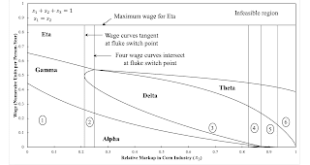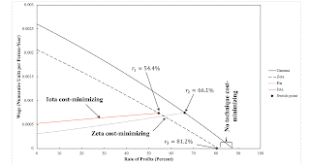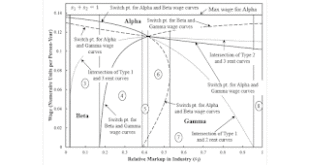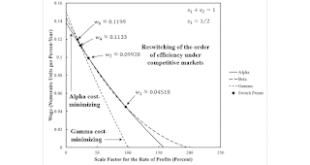I study economics as a hobby. My interests lie in Post Keynesianism, (Old) Institutionalism, and related paradigms. These seem to me to be approaches for understanding actually existing economies.The emphasis on this blog, however, is mainly critical of neoclassical and mainstream economics. I have been alternating numerical counter-examples with less mathematical posts. In any case, I have been documenting demonstrations of errors in mainstream economics. My chief inspiration here is the...
Read More »Variations In Switch Points With Markups In The ‘Corn’ Industry
Figure 1: Variation of Switch Points with the Markup in the Corn Industry1.0 Introduction I have been re-creating some of my past analyses. The graphs in this post look a bit different because I impose a requirement that the relative markups sum to unity. 2.0 Technology Consider an economy which produces three commodities, iron, steel, and corn, with the technology specified in Table 1. Two processes are available for producing each commodity. The coefficients of production in a column...
Read More »Intensive Rent With Two Types Of Land
Figure 1: Wages Curves for Example of Intensive Rent1.0 Introduction This post modifies an example from Antonio D'Agata. Two types of land exist, each specialized for producing a specific commodity. In the example, some wage curves slope upwards, which is not possible in a model with circulating capital alone. The cost-minimizing technique is not found from the outer frontier of the wage curves. For one range of the rate of profits, no cost-minizing technique exists, even though a...
Read More »Givens For Two Approaches To The Theory Of Value And Distribution
1.0 Introduction Broadly speaking, the history of political economy contains two approaches to value and distribution. For purposes of this post, I do not distinguish between classical and Marx's political economy. Institutionalists and those who know about German historical schools, for example, might have a complaint about being ignored. This post is quite unoriginal. I thought I would just record these properties of two approaches. 2.0 Marginalism Marginalist economics is about the...
Read More »Intensive Rent And The Order Of Rentability
I have thought about what would be the minimal structure of an example that combines extensive and intensive rent. I want to include a commodity produced without land, as well as an agricultural commodity. This post considers a simpler example. An analysis of extensive rent includes the identification of the order of efficiency and the order of rentability, given the wage or the rate of profits. I take the concept of these orders from Alberto Quadrio Curzio. Can these orders be defined in...
Read More »Elsewhere
John Cassidy on Donald Harris in the Mew Yorker. Dean Dettloff on The Catholic case for communism in America. Enrico Bellino and Gabriel Brondino, Circular vs. one-way production processes: two different views on production and income distribution, in Review of Political Economy. I want to recall this for my work on Hayekian triangles. Bob Murphy and David Glasner on the Sraffa-Hayek debate. (They spend to much time on monetary policy before getting to the debate.) Leland Yeager and...
Read More »A 1-Dimensional Diagram For Extensive Rent With Markup Pricing
Figure 1: Extensive Rent Example As Relative Market Power Varies Between Industry And Agriculture This post is an elaboration on this past post. The analysis of the choice of technique varies with perturbations of relative markups in industry and agriculture. Figure 1 depicts this variation, while Figure 2 is an enlargement of the lower range of the relative markup in industry. The heavy solid lines in Figure 1, other than the horizontal line at the top, are switch points on the inner...
Read More »Sraffa’s Publications
The following is a list of publications I expect to see in the first volume of Sraffa's collected works: Monetary inflation in Italy during and after the war (This is Sraffa's dissertation). The current situation of Italian banks. Manchester Guardian. 1922. The bank crises in Italy. Economic Journal. 1922. On the relations between cost and quantity produced. Annali di economia 1925. (I think an English translation is in the Cambridge Journal of Economics.) The laws of returns under...
Read More »Extensive Rent With Markup Pricing: An Example
Figure 1: Choice of Technique with Extensive Rent and Competitive Markets1.0 Introduction I am making some slow progress on recreating past posts. For variation, I here take the wage as given. If I write this up more formally, I intend not to try to relate it to Marx's concept of absolute rent. The point is to illustrate the following comment with long-lasting variations in market power between industry and agriculture: "The complexity of the outcomes with the potential existence of...
Read More »Marginalism As A Reaction To Marx
This is another post for my commonplace book. It is extraordinary difficult to get a rational explanation for the marginal revolution. Trying to imitate nineteenth-century physics seems to be part of it. "Marx implicitly assumes the the whole of social reproduction is mediated through the exchange of commodities, including the reproduction of labor power, that is, the reproduction of people themselves. We can view the labor that produces what productive workers consume as the labor...
Read More » Robert Vienneau: Thoughts Economics
Robert Vienneau: Thoughts Economics




